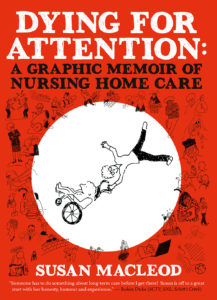Susan MacLeod, MFA’18, vividly remembers the moment she had to decide on the best long-term care option for her elderly mother, who had been hospitalized and could not return to assisted living.
“The social worker was telling me all my options and I knew them inside out, because I had written the brochure. It was so complicated, and she was just rattling it off,” MacLeod says.
Dying for Attention: A Graphic Memoir of Nursing Home Care (Conundrum Press, 2021) is MacLeod’s illustrated memoir of nine harrowing years navigating the long-term care (LTC) system on behalf of her mother. The book is one of CBC’s “21 Canadian comics to watch for” this fall.
 Before experiencing it herself, MacLeod thought she was familiar with long-term care in Nova Scotia. A communications professional by training, she’d been the provincial government’s continuing care spokesperson. “I truly believed we had the best possible long-term care,” she says.
Before experiencing it herself, MacLeod thought she was familiar with long-term care in Nova Scotia. A communications professional by training, she’d been the provincial government’s continuing care spokesperson. “I truly believed we had the best possible long-term care,” she says.
Because she had worked for the department of health, she remembers thinking she would have an inside track when her mother needed care. And she did. “I could pull strings, I knew who to contact. I knew how to do run-arounds—which is totally awful,” she says.
Although MacLeod describes much of the experience that led to Dying for Attention as “horrible,” the book draws readers in with its simple, engaging drawings, its tenderness and its humour. “I wanted to make it funny,” MacLeod says. “There are so many Catch-22s that if you even have a remote sense of humour, you’re going to think, oh, my God. You’ve got to laugh. I tried to make it rueful and light-hearted. I don’t think anyone wants to read an angry book.”
Dying for Attention is the first graphic nonfiction project to come out of the King’s MFA program, but MacLeod—who would sketch incessantly in class—says the program readily accommodated her, pairing her with comics mentors (Doug Wright award winner Rebecca Roher and Conundrum Press publisher Andy Brown) in addition to her narrative writing mentors. “They were so supportive. I am very appreciative of that,” MacLeod says.
As for her drawing style, she says she hit on it partly out of necessity. “I was looking at all kinds of graphic memoirs, and some of the art is beautiful. But I was too tired to do that. I didn’t have the energy. More or less I had to do what came naturally.” In the end, the style was a perfect fit with one of MacLeod’s goals: making the book accessible and easy to read for exhausted caregivers.
The COVID-19 pandemic has, of course, drawn attention to the state of long-term care homes in Canada, with LTC residents accounting for more than 80% of all first-wave deaths, and about 50% of total deaths. MacLeod said those kinds of numbers are devastating, but not surprising. Nobody particularly wants to think about long-term care. Like many, she once believed all was well in the nursing home system. Although she now recognizes that’s not the case, she also wants readers to understand the causes underlying the system’s failures are complex.
“One thing I learned is that I’m pretty tenacious,” she says. “It took me close to six years to write this book, so I welcome the fact that it’s been well received and maybe the timing is right. I do hope that it does achieve my goal of helping people in my situation understand the whole picture.”

